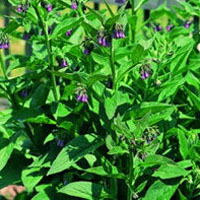
A-Z Indexes Food Health Guides
Health News |
ComfreyFind ProductsAlso indexed as:Symphytum officinale  © Martin Wall © Martin WallBotanical names: Symphytum officinaleSide EffectsComfrey contains potentially dangerous compounds known as pyrrolizidine alkaloids. The roots contain higher levels of these compounds and mature leaves contain very little, if any, of these alkaloids.5, 6 Fresh young leaves contain higher amounts (up to 16 times more than mature leaves) and should be avoided.7 Other related forms, such as Russian comfrey (Symphytum uplandicum) and prickly comfrey (S. asperum), are sometimes available or mistakenly sold as regular comfrey but contain higher levels of these alkaloids.8 Several cases of people who developed liver disease or other serious problems from taking capsules or tea of comfrey have been reported over the years.9 Most comfrey products do not list their pyrrolizidine alkaloid content on the label. Therefore, it is best to avoid internal use of products made from comfrey root or young leaves altogether. Copyright © 2026 TraceGains, Inc. All rights reserved. Learn more about TraceGains, the company. The information presented by TraceGains is for informational purposes only. It is based on scientific studies (human, animal, or in vitro), clinical experience, or traditional usage as cited in each article. The results reported may not necessarily occur in all individuals. Self-treatment is not recommended for life-threatening conditions that require medical treatment under a doctor's care. For many of the conditions discussed, treatment with prescription or over the counter medication is also available. Consult your doctor, practitioner, and/or pharmacist for any health problem and before using any supplements or before making any changes in prescribed medications. Information expires December 2026. |
